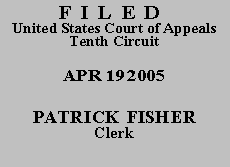

| DANIEL A. HAMRICK,
Plaintiff - Appellant, v. FARMERS ALLIANCE MUTUAL INSURANCE COMPANY; PAULA GREATHOUSE, Director of Kansas Workers Compensation Division; SANDY PRAEGER, Commissioner of Kansas Insurance Department, Defendants - Appellees. |
|
Hamrick suffered a heart attack while on a work assignment and filed for workers compensation benefits. He was awarded benefits by a workers compensation administrative law judge ("ALJ"). The workers compensation appeals board ("Board") affirmed the ALJ's decision in 1997 and the Kansas Court of Appeals affirmed the Board's decision. In November 2000, Hamrick wrote to Farmers Alliance and demanded payment of the 1997 award, but to no avail.
In an action ostensibly independent from his efforts to enforce the 1997 award, Hamrick then filed an application for post-award medical benefits. After a hearing on Hamrick's application, the ALJ issued a decision granting limited relief, which Hamrick appealed. On appeal, the Board partially reversed the ALJ's order and granted penalties for Farmers Alliance's failure to pay the 1997 award and granted reimbursement for additional medical expenses. Because the 1997 award order remained valid and could be enforced in state court, the Board declined to enter a second order to pay the medical expenses. The Board then reminded Hamrick of the enforcement provisions contained in the workers compensation act:
The employee may maintain an action in the district court of the county where the cause of action arose for the collection of such past due disability compensation and medical compensation, any civil penalties due under this section and reasonable attorney fees incurred in connection with the action.
Kan. Stat. Ann. § 44-512a(b).
In affirming the Board's decision, the Kansas Court of Appeals held that Hamrick's due process rights were not violated by the delays in the workers compensation proceedings. Further, the court of appeals concluded that the delays in the proceedings were in large part attributable to Hamrick. The decision also explained that Hamrick could have filed an enforcement action on his award in state court as early as February 1997.
In May 2003, Hamrick suffered another heart attack. He then filed another application for post-award medical benefits in which he requested all medical expenses associated with the May 2003 heart attack. In addition, Hamrick requested a declaration that the expenses awarded in 1997 are still owed. A notice of hearing was sent to Hamrick. He filed an application for review and modification of the Board's earlier decision, and another notice of hearing was sent to him. He then filed this action in federal court and filed a motion for a temporary restraining order to restrain the workers compensation division from proceeding with his administrative hearings.
Proceedings against Praeger and Greathouse were dismissed; the district court concluded that Eleventh Amendment immunity barred the suit and that Younger v. Harris, 401 U.S. 37 (1971), counsels abstention because there is an ongoing state administrative proceeding that would provide an adequate forum to hear Hamrick's constitutional claims, and the state proceeding relates to a matter traditionally resolved by state law workers compensation. As to Farmers Alliance, the court first concluded that the insurance company was not acting under color of state law when it allegedly refused to pay certain claims, and therefore did not deprive Hamrick of property without due process. Further, the court concluded that the Kansas Workers Compensation Act provides the exclusive remedy for workers compensation claims, and therefore Hamrick must go through those established procedures to obtain payment from Farmers Alliance.
Before us, Hamrick fundamentally seeks enforcement of the 1997 workers compensation award, notwithstanding that he has not availed himself of the enforcement procedures set forth in the Kansas Workers Compensation Act. He also seeks additional medical expenses for his second heart attack, ignoring that his right to benefits for his second heart attack needs to be determined by the workers compensation board. Rather than follow the appropriate administrative and state procedures, Hamrick has filed this action in federal court trying to assert federal claims in an apparent attempt to circumvent the state workers compensation procedures. The district court dismissed his case for lack of federal subject matter jurisdiction and we agree with the district court's dismissal. Hamrick's remedy for the collection of the 1997 award lies in an enforcement action in state court pursuant to the Kansas statutory scheme. He must proceed with his workers compensation hearing to determine his right to additional benefits for his 2003 heart attack.
Having reviewed the briefs, the record, and the applicable law, we conclude that the district court correctly decided this case. We therefore AFFIRM the challenged decision for substantially the same reasons stated by the district court.
Hamrick filed several "Objections" during the pendency of this appeal.
These objections do not actually contain any requests for relief. To the extent they can be liberally construed to seek sanctions against the appellees, they are DENIED.
Entered for the Court
Circuit Judge
*. The case is unanimously ordered submitted without oral argument pursuant to Fed. R. App. P. 34(a)(2) and 10th Cir. R. 34.1(G). This order and judgment is not binding precedent, except under the doctrines of law of the case, res judicata, and collateral estoppel. The court generally disfavors the citation of orders and judgments; nevertheless, an order and judgment may be cited under the terms and
1. Hamrick voluntarily dismissed his claims against defendant Kenneth Hursh.